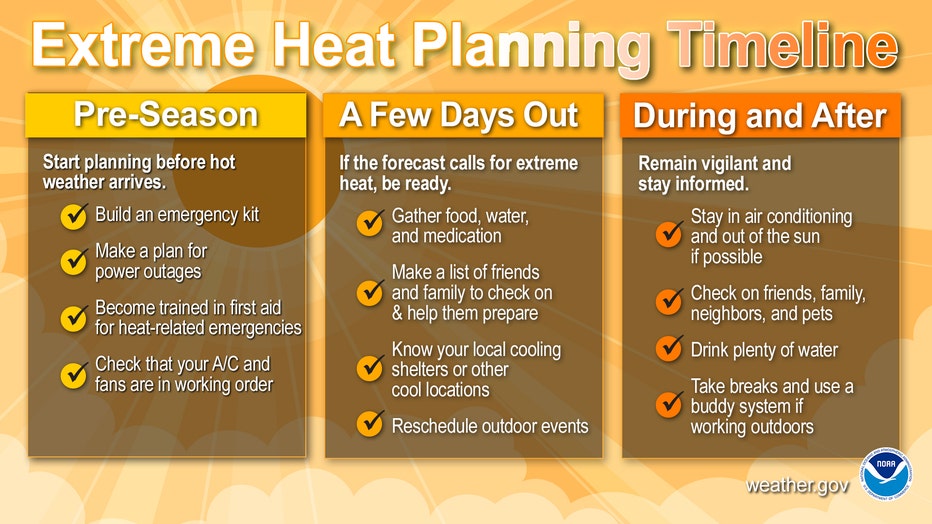Philadelphia heat wave: Staying safe, cool as dangerous heat grips region

Dangerous heat advisory starting Tuesday: Everything you need to know
From Philly pools and ways to stay cool to symptoms of heat-related illnesses, here's some details and tips on what to do ahead a heat wave.
PHILADELPHIA - Dangerous heat has taken hold of Philadelphia and its surrounding area this week. Here’s everything you need to know to stay cool and safe in the record-breaking heat.
Ahead of the scorching summer heat, here are a few things you can do to stay cool, according to the city’s office of emergency management.
How to stay safe and cool during a heat wave
Stay hydrated
Drink lots of water and avoid alcohol, caffeine and sugary drinks.
The city’s Parks and Recs Department has released a list of pools opening across Philadelphia this summer.
Philly also has a list of cooling centers and spraygrounds available where folks can cool off.
Bucks County has also opened several cooling centers to support the community during the extreme heat.
Avoid outside activity during peak hours
Avoid working, exercising or playing outside during the peak of the hottest weather of the day, typically 12 p.m- 5 p.m.
Wear appropriate clothing
Stay cooler by wearing lightweight, light-colored, and loose-fitting clothes. For shade, add a wide-brimmed hat to your outfit or use an umbrella.
Stay cool at home
- Use air conditioners and fans. If you’re using a fan, be sure your windows are open to release any trapped hot air.
- Drapes, shades, or awnings should also be used in your home. According to the city, outdoor awnings can reduce the heat that enters the home by up to 80 percent.
- Take a cool shower or bath.
- If you don’t have access to an air conditioner, spend time in a cool place like a mall, library, senior center, or cooling center.
How to prepare for the heat
The NWS Mount Holly has also created the following extreme heat planning timeline to help you prepare before, during and after the heat advisory.

The National Weather Service Mount Holly
The National Weather Service Prediction Center tweeted key messages for the heat wave to come in the northeast that may linger throughout the following week.
The NWSPC says the duration of the heat wave is potentially "the longest experienced in decades for some locations."
What is a Code Red?
The city may declare a Code Red to protect people who are homeless in the event of severe heat. Pet care is also impacted during a Code Red.
Here is a list of resources provided by the city in the event of a Code Red:
- For people who are homeless: Call the outreach team at (215) 232-1984 if you see someone on the street who needs help. Call 911 if there is a medical emergency.
- For pets: All dogs must have shade to protect them from the sun. If you do not provide your dog shade, you could face a fine of $500 or more. To report a dog left outdoors in very hot weather, call the Animal Care and Control Team (ACCTPhilly) at (267) 385-3800.
In the event the city issues a heat emergency, the office of emergency management has a list of resources that details what to do.
During a heat health emergency, the city encourages folks to call the Heatline, a special helpline number open for calls to get health safety tips and chat with health department nurses about medical heat-related problems. Call the Heatline at (215) 765-9040.
Cooling centers will also stay open later during heat emergencies.

Signs of heat exhaustion, heat stroke
Be prepared for the extreme heat while you are outdoors by watching out for signs of heat exhaustion and heat stroke.
Signs of heat-related illnesses
According to the city, muscle cramps may be the first sign of heat-related illness. Symptoms can include heavy sweating and painful muscle spasms (often in the abdomen, arms, or calves.)
Seek medical attention if the muscle cramps persist for more than one hour
Heat exhaustion can develop after several days of exposure to high temperatures. Those most prone to heat exhaustion are elderly people, people with high blood pressure, and people working or exercising in a hot environment.
Symptoms of heat exhaustion can include heavy sweating, headache, weakness, fatigue, dizziness, fainting, nausea or vomiting.
According to the CDC, a heat illness should be considered an emergency and a call for emergency assistance should be made immediately. While help is on the way, FOX News reports the ill person should be moved to a cool area and their clothing should be removed. If possible, immerse the person in a tub of ice water and if one is not available, then it is recommended the person be placed in a tarp with ice and water. If that is not possible, then soak the person in cold water from a hose or shower and apply cold, wet towels to as much of the skin as possible.
Important Reminders
- Never leave older people, children, or pets alone in cars during a hot day. Be sure to check on older adults who live alone.
- Fire hydrants should not be used to cool off. According to the Philadelphia Water Department, opening hydrants to cool off decreases water pressure and makes it difficult for Philadelphia firefighters to do their jobs, plus it can damage water mains. If you see an open hydrant, call the Water Department’s emergency line at (215) 685-6300.
Stay safe and stay cool.



